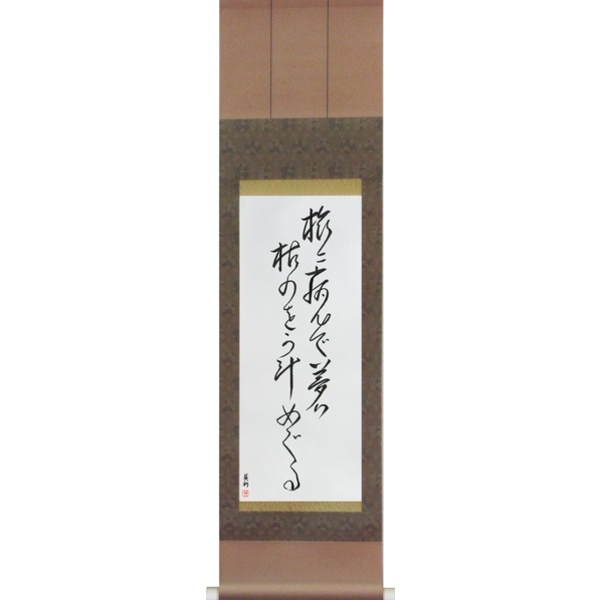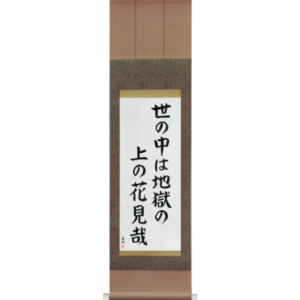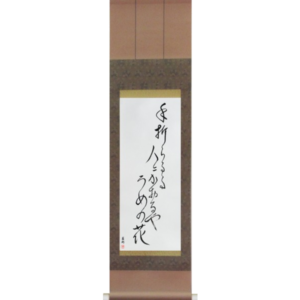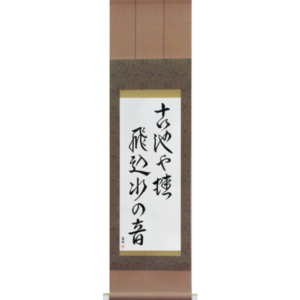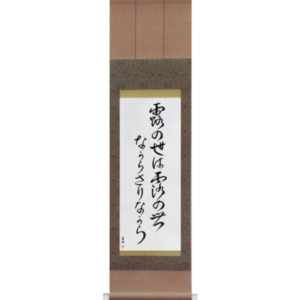H3018 Haiku by Bashou – Taken ill on my travels …
by Master Japanese Calligrapher Eri Takase
Taken ill on my travels,
My dreams roam over
the withered moors [1]
|
tabi ni yande yume wa kareno wo kake meguru |
旅に病んで 夢は枯野を かけ廻る |
| bashou | 芭蕉 |
Jane Hirshfield suggests the translation:
on a jouney, ill,
dreams scouring on
through exhausted fields [2]
Hirshfield quotes Basho:
“I know I shouldn’t be writing haiku now, so close to my death. But poetry is all I’ve thought of for over fifty years. When I sleep, I dream about hurrying down a road under morning clouds or evening mist. When I awaken I’m captivated by the mountain stream’s interesting sounds or the calls of wild birds. Buddha called such attachment wrong, and of this I am guilty. But I cannot forget the haiku that have filled my life.” [2]
Asataro Miyamori suggests the translations:
I’m taken ill while travelling;
And my dreams roam o’er withered moors.
Taken ill on my travels,
My dreams roam over withered moors. [3]
Miyamori writes:
I have spent almost all of my life in travelling. Now I am taken ill on my journey, but my dreams, carrying my soul on them, travel freely like birds. Every spot they convey me to is a desolate, withered moor. I am truding over withered moors in my travelling attire. Now I find myself on a moor of Owari Province, then on a moor of Mino Province.
This verse spontaneously reveals Basho’s habitual mood as an itinerant poet, who was quite content with his wandering life, thoroughly absorbed in the contemplation of nature, and heartily enjoyed a life of loneliness and refinement. It is a beautiful poem with a powerful rhythm and a bold figure of speech. I highly appreciate the personification of “dreams,” “My dreams roam …..,” not “I roam in dreams,” is a supreme expression. [3]
Yoel Hoffman suggests the translation:
On a jouney, ill:
my dreams go wandering
through withered fields. [4]
Hoffman writes:
Died on the twelfth day of the tenth month, 1694 at the age of fifty-one
This is the last poem of one of the greatest haiku poets. Basho had fallen seriously ill on one of his travels. When his pupils hinted that he ought to leave a farewell poem, he replied that any of his poems could be his death poem. Nevertheless, on the eighth day of the tenth month, after gathering his pupils around his bed, he wrote this poem. He died four days later. [4]
Jane Reichhold suggests the translation:
ill on a journey
dreams in a withered field
wander around [5]
R. H. Blyth suggests the translation:
Ill on a journey;
My dreams wander
Over a withered moor. [6]
Harold Henderson leaves us with:
In 1694 Basho died, and died as he would have wished, on one of his beloved wanderings, and surrounded by many of his friends and pupils. During his last illness he was constantly discussing religion and philosophy and poetry (three things that were almost one to Basho), and when it became evident that he was dying his friends asked him to give them a “death poem” – the sum of his philosophy. Basho refused, on the ground that every poem in his last ten years, starting with the “old pond” haiku, had been composed as if it were a death poem. But on the next morning he called them to his bedside, saying that during the night he had dreamed, and that on waking a poem had come to him. And he gave them:
On a journey, ill,
and over fields all withered, dreams
go wandering still.Surely as lovely a farewell as any poet ever gave to the world. [7]
References:
[1] Translation by Timothy L. Jackowski, Takase Studios, LLC. Though this borrows from the translations of Asataro Miyamori.
[3] 218-219.
[4] 143.
[5] 231, 394.
[6] 107.
[7] 29-30.
